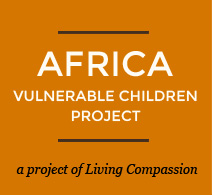It is time for Cheri and Ashwini to return home. Having them on the ground was giant for strategic planning for the project. Theresa had commented early on how often she has “ideas in her head of things to do, next steps, but no one to discuss them with.” It was thrilling for her and for all of us to be together for these days, to look at where we are, and to see what life is offering next (now).
The clarity that arose in our conversations was exhilarating. We, Sreedevi and Jen, now have a full, fun week ahead of us as we begin to put the pieces in place.
Earlier in the week, Cheri had the idea to make a big poster of the qualities of Theresa. We realized the poster, in addition to honoring and thanking Theresa for all she is and all she does, could be a tool of learning and modeling for the children at the Living Compassion property. Before leaving the guesthouse to take Cheri and Ashwini to the airport this morning, we presented Theresa with the poster.
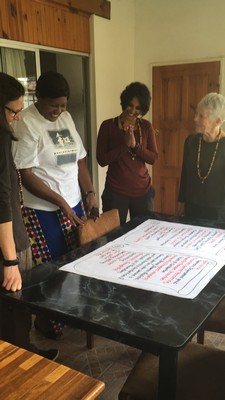
“You are going to make me cry,” was Theresa’s comment as she read the scroll. “I am humbled.” We all had a good laugh pointing to the word “humble” on the list. We rest our case.
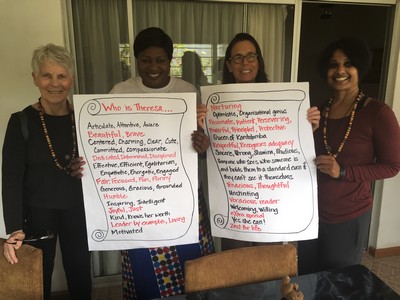
After saying goodbye to Cheri and Ashwini, we continued into town for our first mission—chitenge.
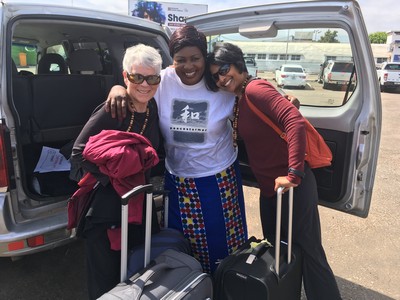
We couldn’t believe it was already time to say goodbye, yet it felt like they had been here a lifetime. Truly a remarkable amount accomplished!
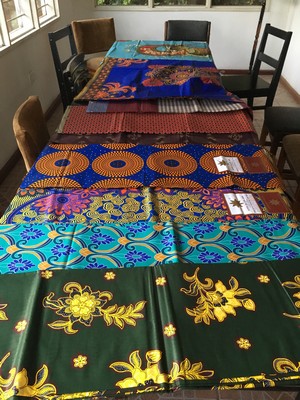
No trip is complete without picking out some beautiful pieces of African fabric.
One thing we are all clear about is how precious a resource Theresa is to our Living Compassion family. Medical care can be tricky here. There is a huge need for it, and facilities can be over-crowded and under-funded. Over the years we have heard about a highly recommended clinic in Ndola and wanted to begin a relationship with them as the place Theresa can go whenever she needs medical attention.
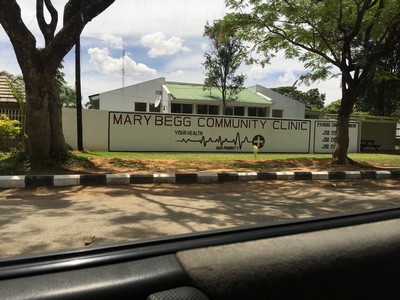
Mary Begg clinic, said to be among the best care you can receive in Zambia.
Theresa and Jen met with a doctor who did a complete physical on Theresa. They were astounded at the time he took with them to carefully explain what he was finding and answer all questions carefully and completely.
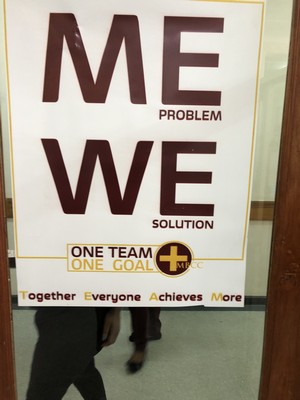
We all agreed this poster, hanging on the wall of the clinic, is the best practice poster we have ever seen. ME: problem. WE: solution. Can’t get clearer than that!
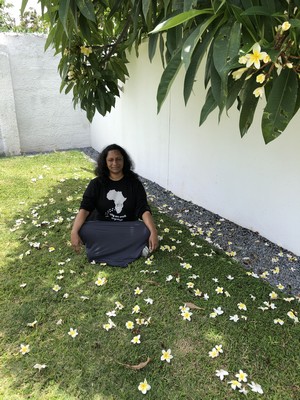
Sreedevi found a quiet spot outside the clinic to take a meditation break.
We had arranged for Martha, our local accountant, to meet us out in Kantolomba in the afternoon. She had done some research and found a bank that had special account services for NGOs, making wiring money a good deal cheaper. We needed to meet to go over the paperwork.
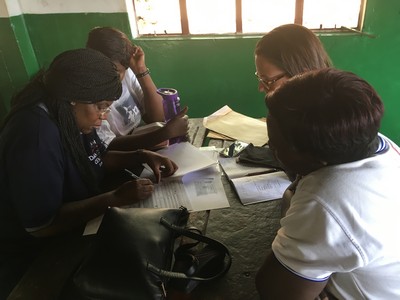
The finance team filling out new bank forms
While out at the property, we began some of the strategic conversations on our docket.
We are about to enter our fourth year of the Girls Program and have learned a lot. It started with a focus on education, supporting the girls to have fees for school, a weekly stipend, and general support in their academic subjects.
Having now gone through the experience of enrolling our first two girls in college, and considering future employment opportunities, it is clear that the one true thing we have learned is that excelling in English conversation, reading, and comprehension is the highest indicator of success.
We also spoke with Anne, one of our teachers, who is one of our strongest English speakers. She shared that without fluent English, there really isn’t any possibility to move forward. Anne is someone we have our eye on to help us implement a more focused English language program, and when we brought this up, she readily agreed. She shared, “I love what I do. If you don’t love what you do, what is the point?”
Prior to this year, all of our girls were in government school where there are as many as 70 or more students in one room and just one teacher. In grades 1-3, only Bemba is spoken, with no English language support. Regardless of how bright a student is, this environment makes it nearly impossible to succeed. Therefore, this year, we moved our brightest girls from government school to a private school, where only English is spoken. Already, we are seeing incredible results, with our girls improving their English and overall comprehension and learning significantly.
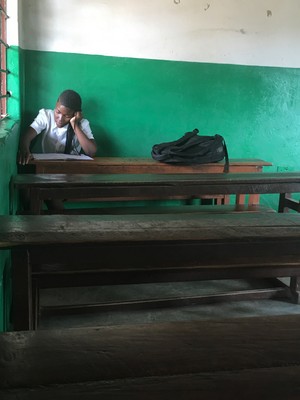
We found Joyce Makina, who is in Grade 8 at the private school, alone in a room at the property after most of the children had left. We asked her what she was doing, and she shared that she has a test tomorrow, and was studying up for it. WOW.
We also see that starting our girls as early as possible in that environment is essential. We spoke with the pre-school teachers about which girls they would recommend start at Grade 1 at the private school and are excited to launch a second phase of the Girls Program with an additional group of girls.
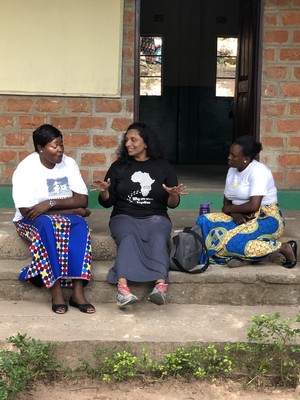
Theresa, Sreedevi and Memory discuss the possibilities of the Girls Program.
One of the greatest pleasures of participating in this work is the moments here and there when we get to just be with the team as they engage in their daily activities. This afternoon we had time to sit with the cooking team as they prepared the final pot of nshima for the day. Some of the older students who have longer school days don’t arrive on the property to eat until much later in the afternoon. The cooking team stays until the final 1000th child has been fed each day.
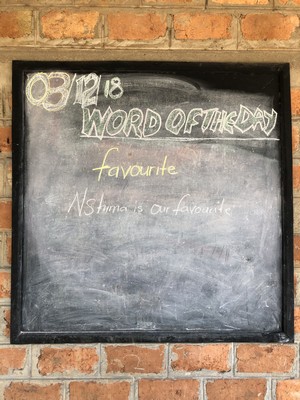
The word of the day, used in a sentence, indicates how much everyone loves nshima.
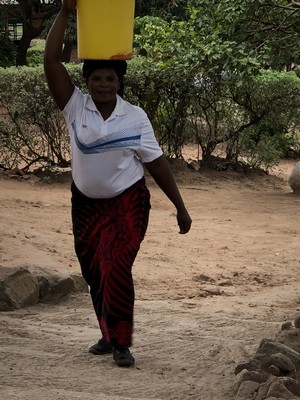
First Jacqueline brings up one of the two 5-gallon buckets of water.
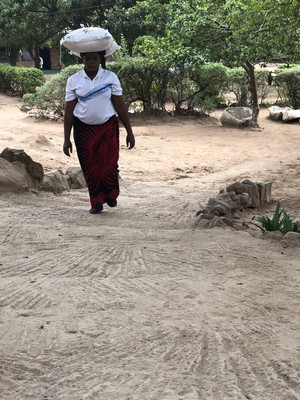
Next she brings the sack of mealie meal, the corn that you use to make nshima.
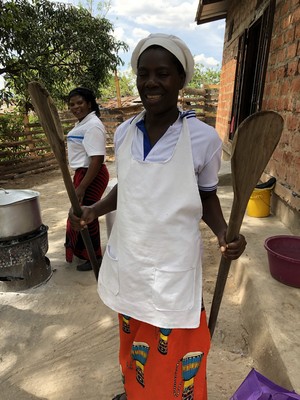
Charity bringing up the giant paddles used to stir
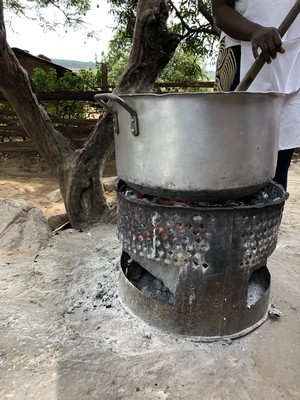
The water sits on the charcoal braziers for about 25 minutes to come to a boil.
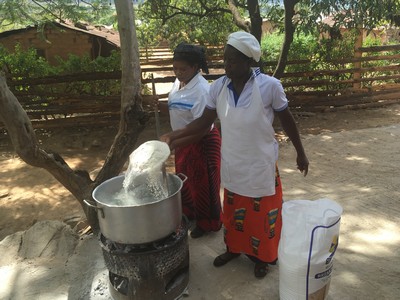
Then the mealie meal starts to be poured in.
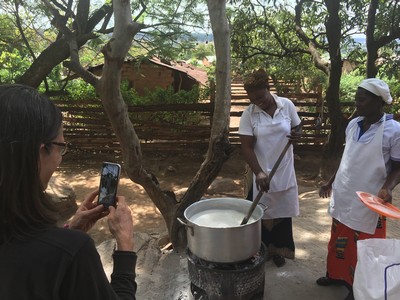
Stirring is the aerobic part of the program. They take turns; here is Joanne.
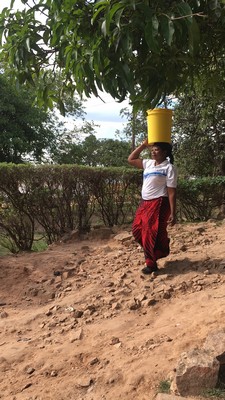
The completed nshima is transferred to buckets to be carried to the dining room.
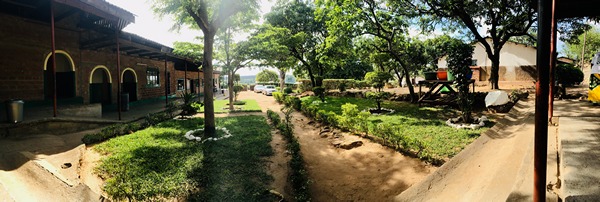
What a beautiful property!
On the way back to the guesthouse we marveled at all that had been accomplished today. ‘Tis a mighty team, this!
